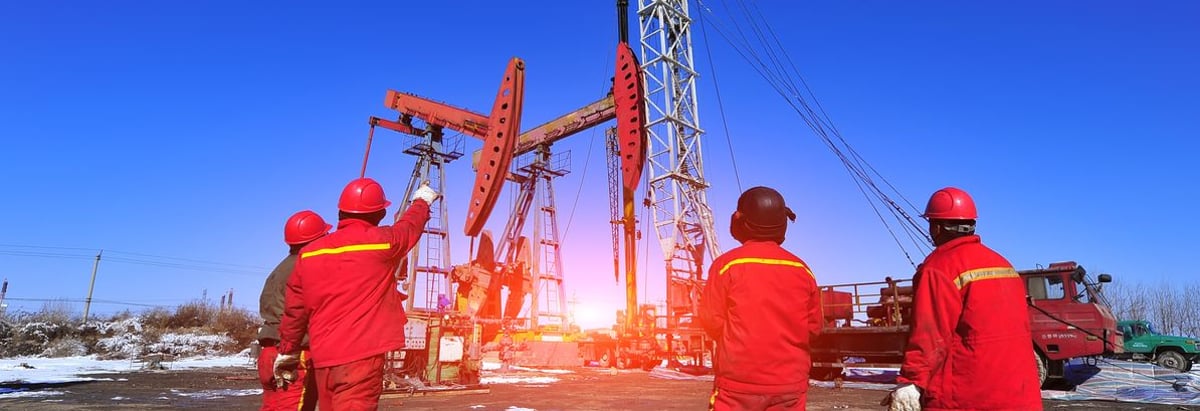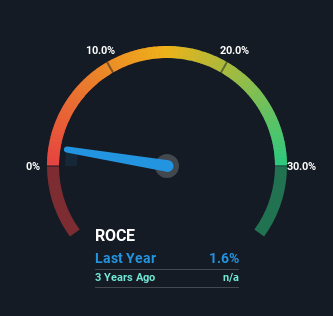- Norway
- /
- Energy Services
- /
- OB:SDNS
Here's What's Concerning About Shelf Drilling (North Sea)'s (OB:SDNS) Returns On Capital

What financial metrics can indicate to us that a company is maturing or even in decline? More often than not, we'll see a declining return on capital employed (ROCE) and a declining amount of capital employed. Ultimately this means that the company is earning less per dollar invested and on top of that, it's shrinking its base of capital employed. On that note, looking into Shelf Drilling (North Sea) (OB:SDNS), we weren't too upbeat about how things were going.
Return On Capital Employed (ROCE): What Is It?
For those who don't know, ROCE is a measure of a company's yearly pre-tax profit (its return), relative to the capital employed in the business. The formula for this calculation on Shelf Drilling (North Sea) is:
Return on Capital Employed = Earnings Before Interest and Tax (EBIT) ÷ (Total Assets - Current Liabilities)
0.016 = US$6.7m ÷ (US$472m - US$43m) (Based on the trailing twelve months to December 2023).
So, Shelf Drilling (North Sea) has an ROCE of 1.6%. Ultimately, that's a low return and it under-performs the Energy Services industry average of 9.8%.
See our latest analysis for Shelf Drilling (North Sea)

In the above chart we have measured Shelf Drilling (North Sea)'s prior ROCE against its prior performance, but the future is arguably more important. If you'd like to see what analysts are forecasting going forward, you should check out our free analyst report for Shelf Drilling (North Sea) .
How Are Returns Trending?
In terms of Shelf Drilling (North Sea)'s historical ROCE movements, the trend doesn't inspire confidence. About one year ago, returns on capital were 4.4%, however they're now substantially lower than that as we saw above. Meanwhile, capital employed in the business has stayed roughly the flat over the period. Since returns are falling and the business has the same amount of assets employed, this can suggest it's a mature business that hasn't had much growth in the last one year. If these trends continue, we wouldn't expect Shelf Drilling (North Sea) to turn into a multi-bagger.
The Key Takeaway
All in all, the lower returns from the same amount of capital employed aren't exactly signs of a compounding machine. It should come as no surprise then that the stock has fallen 14% over the last year, so it looks like investors are recognizing these changes. That being the case, unless the underlying trends revert to a more positive trajectory, we'd consider looking elsewhere.
On a final note, we've found 1 warning sign for Shelf Drilling (North Sea) that we think you should be aware of.
If you want to search for solid companies with great earnings, check out this free list of companies with good balance sheets and impressive returns on equity.
If you're looking to trade Shelf Drilling (North Sea), open an account with the lowest-cost platform trusted by professionals, Interactive Brokers.
With clients in over 200 countries and territories, and access to 160 markets, IBKR lets you trade stocks, options, futures, forex, bonds and funds from a single integrated account.
Enjoy no hidden fees, no account minimums, and FX conversion rates as low as 0.03%, far better than what most brokers offer.
Sponsored ContentNew: Manage All Your Stock Portfolios in One Place
We've created the ultimate portfolio companion for stock investors, and it's free.
• Connect an unlimited number of Portfolios and see your total in one currency
• Be alerted to new Warning Signs or Risks via email or mobile
• Track the Fair Value of your stocks
Have feedback on this article? Concerned about the content? Get in touch with us directly. Alternatively, email editorial-team (at) simplywallst.com.
This article by Simply Wall St is general in nature. We provide commentary based on historical data and analyst forecasts only using an unbiased methodology and our articles are not intended to be financial advice. It does not constitute a recommendation to buy or sell any stock, and does not take account of your objectives, or your financial situation. We aim to bring you long-term focused analysis driven by fundamental data. Note that our analysis may not factor in the latest price-sensitive company announcements or qualitative material. Simply Wall St has no position in any stocks mentioned.
About OB:SDNS
Shelf Drilling (North Sea)
Operates as a shallow water offshore drilling contractor in Denmark, Qatar, the United Kingdom, and Norway.
Exceptional growth potential and slightly overvalued.
Market Insights
Community Narratives



